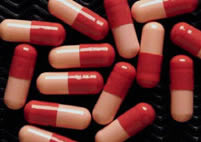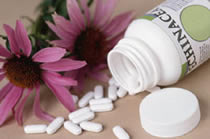|
In early 2004, a study published in the Journal of the American Medial Association (JAMA) found a statistical link between the use of some classes of antibiotics and breast cancer:
Use of antibiotics is associated with increased risk of incident and fatal breast cancer. It cannot be determined from this study whether antibiotic use is causally related to breast cancer, or whether indication for use, overall weakened immune function, or other factors are pertinent underlying exposures.
Thus, the authors note the link between antibiotics and cancer without saying whether antibiotics actually cause an increased risk of cancer, whether the cancer and
 antibiotic use are coincidental to underlying conditions in the body, or whether there is some indirect mechanism at work. The authors urge prudence when it comes to long-term use of antibiotics, and they also urge further study.
antibiotic use are coincidental to underlying conditions in the body, or whether there is some indirect mechanism at work. The authors urge prudence when it comes to long-term use of antibiotics, and they also urge further study.
So, does that leave us with the feeling of the same-old, same-old—a study that kicks up a lot of dust but doesn't really tell us anything? Ultimately, that is for each of us to decide for ourselves, but some of the issues raised by the study are worth thinking about. In particular, the potential mechanisms by which the antibiotics could increase a person's risk of cancer may prove illuminating.
The authors suggest a few possible mechanisms wherein use of antibiotics could cause an increased risk of cancer:
- An underlying condition in the body that requires the antibiotics but also increases the likelihood of contracting breast cancer. (For instance, a weakened immune system could both allow more infections to occur and fail to dispatch emerging cancer cells.)
- Antibiotic suppression of the "good bacteria" in a person's intestinal tract. (This could lead to lower production of anti-cancer compounds in the body and poorer metabolism of some compounds that promote cancer.)
- Direct effects of the drug on immune and inflammatory responses that could increase cancer risk.
Here are a few possibilities that the authors did not mention:
- The long-term toxic effects of the drugs on body function. (They are, after all, chemicals.)
- A surge in the growth of gut pathogens (upon suppression of the good gut bacteria) that produce toxins and indirectly interfere with immune function.
- Overburdening of liver function by the drugs, potentially reducing the liver's effectiveness at managing the body's total daily load of toxins, which in turn could increase susceptibility to cancer and other problems.
All drugs, including antibiotics, have side effects. Your doctor can usually give you an overview of the side effects, though inquiring minds will want to get the full scoop in their local library's copy of the Physician's Desk Reference. Even that, though, may not always cover more subtle effects that are very long term in nature, such as a potential increased risk of cancer.
So, what is a person to do about infections? One thing might be to adopt a strategy of "Integrated Pest Management" (IPM). It may seem strange to think that a concept from the world of pest control could help us stay healthy, but bear with us for a moment.
 IPM encompasses a variety of tools to control pests—sanitation, physical exclusion, natural predators, as well as natural and chemical pesticides. The idea is to use prevention and least-toxic methods to control pests. Toxic chemical pesticides are a last resort. So too in your body should chemical drugs be a last resort. Other facets of your personal IPM strategy might include proper food sanitation; good nutrition, including probiotics such as L. acidophilus for your intestinal tract; regular exercise; and stress reduction. In the event of an infection, the least-toxic methods one might try first include appropriate herbs, folk remedies, and other natural products. Sometimes all that's needed is time and rest so your body can heal itself. Only in the event that these preventative and least-toxic approaches fail would more toxic solutions be sought.
IPM encompasses a variety of tools to control pests—sanitation, physical exclusion, natural predators, as well as natural and chemical pesticides. The idea is to use prevention and least-toxic methods to control pests. Toxic chemical pesticides are a last resort. So too in your body should chemical drugs be a last resort. Other facets of your personal IPM strategy might include proper food sanitation; good nutrition, including probiotics such as L. acidophilus for your intestinal tract; regular exercise; and stress reduction. In the event of an infection, the least-toxic methods one might try first include appropriate herbs, folk remedies, and other natural products. Sometimes all that's needed is time and rest so your body can heal itself. Only in the event that these preventative and least-toxic approaches fail would more toxic solutions be sought.
|
|
AH-CHOO BOO-BOO |
|
Every year, many millions of antibiotic prescriptions are given to patients with non-bacterial acute respiratory infections, problems on which antibiotics will have no effect. Even when infections are bacterial in nature, patients are often too quick to ask for drugs. Harried doctors often find it easier to acquiesce to the request than to insist the patient give their body time to heal on its own. The overuse of antibiotics is slowly degrading their overall performance as pathogens gain resistance.
There is also an environmental downside to antibiotics: Once excreted and flushed, they pass through municipal sewage plants—which are rarely equipped to filter the drugs from the water—and then into our streams, rivers, and drinking water. Study of how low background levels of drugs in the water affect wildlife and humans is just beginning.
|
|
It's up to you and your doctor to determine the timing of these steps, but using a personal IPM strategy can help you reduce any unnecessary exposure to antibiotics.
Resources:
More articles and resources on....
|


